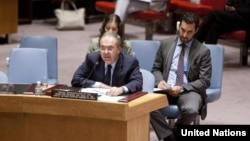NEW YORK —
A senior United Nations diplomat says Libya continues to face a difficult transition from the regime of Moammar Gadhafi, whose 42-year rule ended in 2011.
Tarek Mitri, the United Nations special representative for Libya, told the U.N. Security Council the risks in Libya should not be underestimated. But he added that the opportunities in that country should not be overlooked.
Mitri, the Lebanese-born head of the U.N. Support Mission in Libya, said the Libyan elections last year to the General National Congress may have led people to think the road to democracy would be simple.
“As important as these elections in July 2012 may have been in ushering in the beginnings of a new political process and the building of legitimate state institutions, the Libyan people will continue to endure during the foreseeable future the heavy legacy bequeathed to them over decades of brutal rule. Managing the transition is bound therefore to be difficult, perhaps more difficult than we thought a year ago,” he said.
Mitri’s remarks were echoed by British ambassador Mark Lyall Grant, president of the Security Council this month, who discussed the Council’s closed door talks on Libya that followed Mitri’s public comments. Lyall Grant told reporters there is a commitment of the international community to help Libya address what he called its “security challenges.”
“I think there is a desire of the international community to support this transition. It’s proving to be difficult and you would expect that after 42 years of dictatorship with no institutions, with no elections taking place. There was infrastructure but there were no institutions in the country as a whole. So it’s not surprising that it’s taking some time,” said Grant.
In his remarks to the Security Council, U.N. diplomat Mitri was critical of a law adopted by Libya last month that bans anyone who held a senior post in the Gadhafi government from holding a position in the new government.
“Written advice was provided to the General National Congress on international standards, best practices and potential risks of exclusionary measures. And I must say that the approved law falls short of these standards in a number of areas,” he said.
Mitri said implementation of the law risks further weakening Libya’s state institutions. The president of Libya’s General National Congress, Mohammed Magarief - a former Libyan diplomat who later became an opposition figure living in exile - resigned on May 28.
Tarek Mitri, the United Nations special representative for Libya, told the U.N. Security Council the risks in Libya should not be underestimated. But he added that the opportunities in that country should not be overlooked.
Mitri, the Lebanese-born head of the U.N. Support Mission in Libya, said the Libyan elections last year to the General National Congress may have led people to think the road to democracy would be simple.
“As important as these elections in July 2012 may have been in ushering in the beginnings of a new political process and the building of legitimate state institutions, the Libyan people will continue to endure during the foreseeable future the heavy legacy bequeathed to them over decades of brutal rule. Managing the transition is bound therefore to be difficult, perhaps more difficult than we thought a year ago,” he said.
Mitri’s remarks were echoed by British ambassador Mark Lyall Grant, president of the Security Council this month, who discussed the Council’s closed door talks on Libya that followed Mitri’s public comments. Lyall Grant told reporters there is a commitment of the international community to help Libya address what he called its “security challenges.”
“I think there is a desire of the international community to support this transition. It’s proving to be difficult and you would expect that after 42 years of dictatorship with no institutions, with no elections taking place. There was infrastructure but there were no institutions in the country as a whole. So it’s not surprising that it’s taking some time,” said Grant.
In his remarks to the Security Council, U.N. diplomat Mitri was critical of a law adopted by Libya last month that bans anyone who held a senior post in the Gadhafi government from holding a position in the new government.
“Written advice was provided to the General National Congress on international standards, best practices and potential risks of exclusionary measures. And I must say that the approved law falls short of these standards in a number of areas,” he said.
Mitri said implementation of the law risks further weakening Libya’s state institutions. The president of Libya’s General National Congress, Mohammed Magarief - a former Libyan diplomat who later became an opposition figure living in exile - resigned on May 28.




